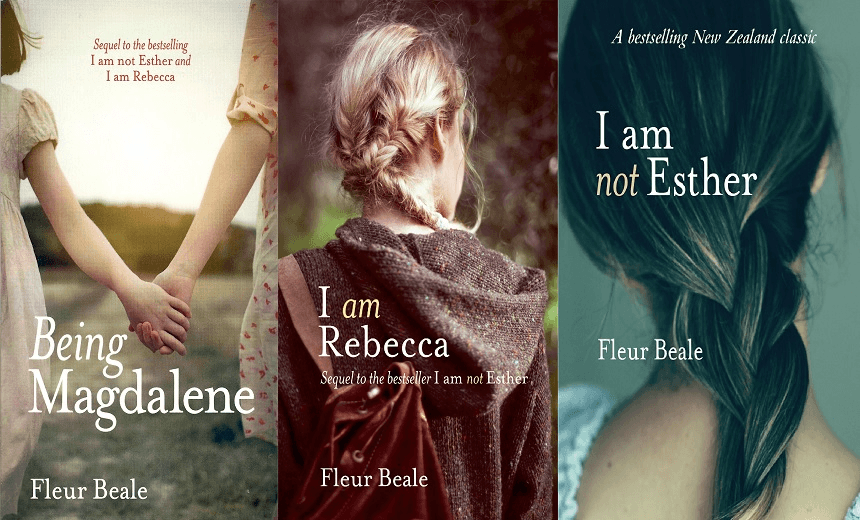An interview with the amazing Fleur Beale, whose latest YA novel Being Magdalene continues her series of books set in the Children of the Faith religious cult.
I read Fleur Beale’s most recent YA book, Being Magdalene, while caught up in the swirl of the Ted Dawe book-banning controversy. I helped to write Booksellers NZ’s submission against the banning or restriction of In the River, which gave me pause to think about the media attention given worldwide to something seemingly so minor. Nobody killed, maimed or abused anybody. All Ted did was write a book that had underage sex in it. It was banned thanks to the actions of an extremist, who happened to be the President of the Film & Literature Board of Review. The reaction of the media to this event led me to think about how much we value free will. And that led me to want to talk to author Fleur Beale.
Fleur began writing about teenagers in cults with one of her earliest books, I am Not Esther, which was published in 1998, and won the Gaelyn Gordon Award for a Best-Loved Book in 2009. She was inspired to write it by the experience of a boy from a Christian fundamentalist sect who attended the high school where she taught English.
Then in 2007, Beale began the three-part Juno of Taris series, one of my favourite NZ YA series’ of all time – featuring a girl who is being forced to live by the outrageous rules of the Children of the Faith cult. Nobody is allowed to learn to read, and the citizens are forced to shave their hair.
And in 2009, she wrote an adult non-fiction book, Sins of the Father, based on the story of Phil Cooper, who left Gloriavale. Finally, Fleur went back to the story of the Children of the Faith, with I am Rebecca in 2013, and Being Magdalene this year.
So why is Fleur fascinated by cults? Did she have organised religion as part of her upbringing? ‘No, only disorganised religion,’ she says. ‘Mum was always really interested in exploring other religions. One of them was Rosicrucianism. Then, Dianetics – a forerunner of Scientology. Some Eastern religions. She had books by Mary Baker Eddy, the founder of the Christian Science movement, but was never interested in joining the religion.
What draws here to write about cults? ‘It’s a bit worrying, isn’t it, that I’m so drawn to it. After I’d written the Juno story in particular, I got into the Gloriavale story and I thought , “I made all this stuff up, and there it is.”
‘I think when you’re a teenager, you’re trying to find your place in the world and there are a lot of people who appear to you to stand in your way. It’s something that’s true right through our lives, I don’t think it’s just a teenage thing. So [writing about cults] is a good method to show the control of society, a society that’s self-contained.’
A novel about ideas will only work, though, when it’s telling a powerful story. She says, ‘If you write with a theme in mind, you twist the story. Your characters start doing things that they shouldn’t be doing in terms of who they are. It is better to try to tell a strong story that remains true to who the character is.’
Each of the three Children of the Faith books feature different main characters. I am not Esther was about Kirby, who is moved into her uncle’s home, given a new name, and forced to follow the rules. I am Rebecca is about an older daughter (one of twins) fully within the faith, but who knows a little about the outside world.
In Being Magdalene, the title character has never been outside the faith, goes to a faith school, and doesn’t want to change her life – but her sister needs her help.
As the third book in her Children of the Faith trilogy, it features a character leave a cult, and cope with the hole that this leaves in their life. It’s fascinating to follow Magdalene’s journey back into the world we live in,
‘In a way,” says Fleur, ‘it reflects the different ages of the children. If you’ve grown up completely in a cult regime, you don’t have outside knowledge. Magdalene was too young at the time Esther’s visit to learn anything, so she was pretty much on her own in terms of faith. Her little sister gave her the strength to leave.”’
Fleur was able to draw on her experience in writing Sins of the Father in relation to Magdalene’s plight. ‘It deeply affected the Cooper family who I wrote about. It was a very hard adjustment to the real world, partly because they lost their mother. She came and went, then ultimately stayed with the cult.’
What does she see as her own power as a writer? She says, ‘You’ve got the power to create your own world, and make the characters behave as you want them to. You’ve got to be careful it fits that world – not just give them behaviours you want them to have, I’ve discovered – as I rewrote about half of I am Rebecca.’
Free access to books is often seen by cults and other restrictive regimes as too dangerous – in Juno, nobody is meant to be able to read, and in The Children of Faith, they can read only Scripture. ‘It’s the danger of ideas,’ says Fleur. ‘Different ways of being. Saying, “Look, the world doesn’t have to be the way that you live it.” ‘
Join the cult of free will.

